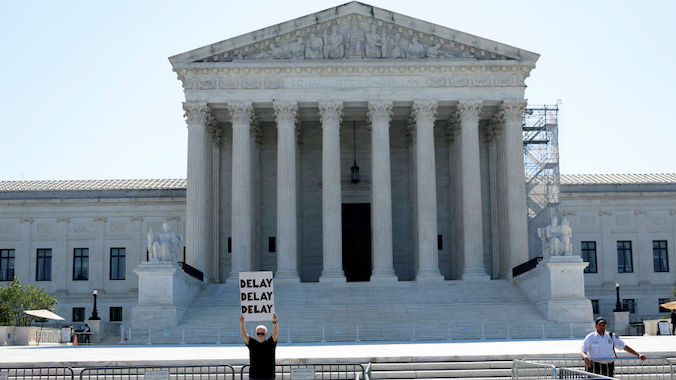The Supreme Court Continues Its War on the EPA
Photo by Anna Moneymaker/Getty Images
It’s difficult to come to any other conclusion than the conservative Justices on the Supreme Court simply don’t think the Environmental Protection Agency should exist.
In its latest attack in Ohio v. EPA, the Court ruled 5-4 (Amy Coney Barrett joined the liberal Justices) to stay the so-called “Good Neighbor” rule from the Agency, which aimed to regulate harmful emissions from power plants and industry that cross state lines. A collection of states, industry groups, and others had petitioned to stop the rule because it would cost them a lot of money, and claimed it was illegal. The Court held that the EPA has not sufficiently answered those concerns.
What’s notable here is that SCOTUS took up the case on an emergency basis while it is still being litigated in the D.C. Court of Appeals. The emergency, given that the rule wasn’t even due to go into effect in all relevant states until 2026, is a bit of a mystery.
The Agency estimates that by cutting out substantial portions of nitrous oxide emissions that can travel hundreds of miles downwind, the rule would stave off 1,300 premature deaths in 2026 alone. It would also avoid 2,300 hospital and emergency room visits and avoid 25,000 lost workdays and 430,000 school absences. “Every community deserves fresh air to breathe,” EPA Administrator Michael Regan said in March when the final rule was announced. “We know air pollution doesn’t stop at the state line.”
The “emergency” stay of the Good Neighbor plan is a massive gift to polluting industries and is also perfectly in keeping with the conservative Court’s war on environmental regulation. Last year, the Court kneecapped the Agency’s ability to protect wetlands, relying on an absolutely tortured definition of the word “adjacent”. The year before, the conservative Justices stopped a rule limiting greenhouse gas emissions from power plants, claiming essentially that carbon dioxide doesn’t count as a pollutant under the Clean Air Act, because regulating it would mean coal goes away.
The specific arguments in these cases don’t even really matter. The conservative Justices will always find a way to side against environmental regulation of essentially any kind, and especially the sort that might mildly inconvenience massive corporations and the very rich people who like to take Justices on yacht trips. They even seem to enjoy throwing in one vote with the liberals to make it look good — Barrett in Ohio v. EPA, or Kavanaugh in the wetlands case, both arguing on essentially procedural grounds against the majority.
Environmental groups were predictably pissed off at today’s ruling. “The Court’s extraordinary decision today to grant an emergency stay is a travesty of justice that puts the lives and health of millions of people at risk,” said Vickie Patton, the general counsel for the non-profit Environmental Defense Fund, in a statement. “The Good Neighbor Plan has a rock-solid legal foundation in the Clean Air Act’s Good Neighbor provision and in long-standing precedent.”
The Sierra Club’s chief energy officer Holly Bender decried the unusual emergency status granted this petition. “By allowing polluters to short-circuit the normal process of judicial review, it sets a dangerous precedent,” she said. “Giving corporate polluters a pass to keep prioritizing profits over people is a devastating outcome for public health.”